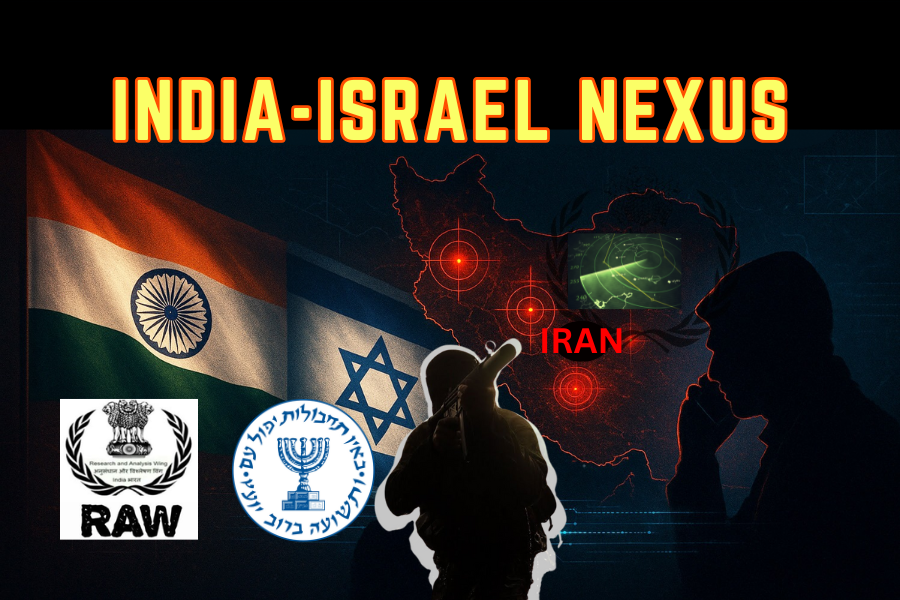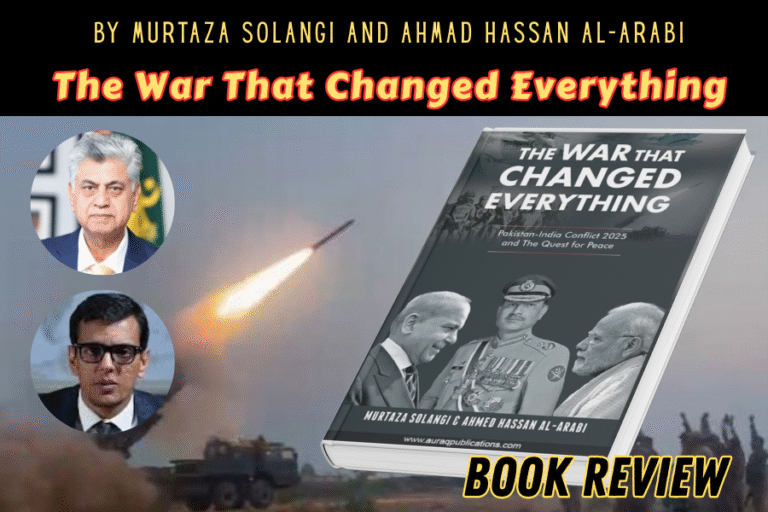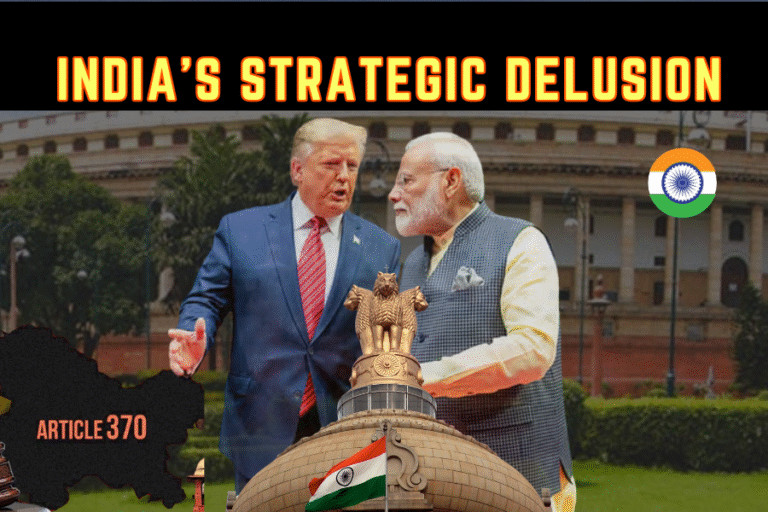Beneath the smoldering tensions of the Middle East, a covert drama unfolded in June 2025, as Iran’s Islamic Revolutionary Guard Corps (IRGC) arrested 73 individuals, including 13 Indian nationals, on charges of espionage for Israel’s Mossad. Accused of enabling Israel’s audacious drone strikes by targeting Iran’s air defences, these detainees have thrust India into a geopolitical maelstrom, exposing a clandestine nexus with Israel and imperiling ties with Iran. As New Delhi deepens its strategic embrace of Tel Aviv, this scandal illuminates the perilous dance of statecraft and espionage, where alliances forged in shadow can unravel in the harsh light of exposure. This article dissects the arrests, their historical roots, the India-Israel partnership, and the diplomatic fallout, revealing a region on the brink of realignment.
I. Introduction: A Covert Crisis Unfolds
On June 14, 2025, Iranian state media reverberated with a stunning announcement: the detention of 73 suspected Mossad operatives, among them 13 Indian citizens, accused of abetting Israel’s devastating strikes on Iranian military and nuclear sites. The arrests, following Israel’s June 13 operation, code-named “With the Strength of a Lion,” mark a bold escalation in the Israel-Iran shadow war, with India unexpectedly ensnared. Iran alleges the Indian nationals, holding work visas, provided critical intelligence on air defence systems, facilitating precision attacks that felled senior IRGC commanders and nuclear scientists. Reported by outlets like DND News, this incident amplifies tensions among India, Israel, and Iran, exposing the fragility of covert alliances in a polarized Middle East. As India pursues its “Act West” policy while preserving historic ties with Iran, the arrests herald a pivotal moment for South Asian and Middle Eastern geopolitics.
II. The Arrests: Anatomy of an Espionage Scandal
The IRGC’s sweeping operation, launched amid Israel’s strikes, targeted 73 individuals across Tehran and Alborz provinces, with 13 Indians singled out for their alleged role in Mossad’s covert network. Iranian media, including IRNA, claim the Indians, employed in Iran under work visas, provided logistical and intelligence support, pinpointing air defence radar locations and missile launchers near Tehran. Two operatives reportedly possessed 200 kilograms of explosives and drone equipment, suggesting complicity in smuggling weapons used in Israel’s attacks, which included drones launched from a covert base inside Iran.
Iran’s judiciary, under Gholam-Hossein Mohseni-Eje’i, vowed “swift punishment” for collaborators, framing the arrests as a counterstrike against a national security breach. The Indian nationals, whose identities remain undisclosed, face charges under Iran’s penal code, including “moharebeh” (waging war against Allah) and espionage, which carry potential death sentences. Iranian authorities seized equipment in Rey, Tehran province, including suicide drones, launchers, and 200 kilograms of explosives, linking the group to Mossad’s sophisticated operations.
India’s Ministry of External Affairs (MEA) has maintained a studied silence, neither confirming nor denying the arrests. Diplomatic sources suggest New Delhi is quietly pursuing consular access, but public restraint reflects the issue’s sensitivity. Posts on X and other social media platforms claim of a “RAW-Mossad alliance” fueling regional destabilization, amplify anti-India sentiment in Iran and Pakistan, complicating India’s position. If substantiated, the arrests reveal an audacious Indian role in Israel’s intelligence network, raising questions about New Delhi’s covert operations in hostile territory.
III. Historical Precedents: India’s Shadowy Ties with Mossad
The 2025 arrests are not India’s first entanglement with Mossad-related espionage in the region. In 2023, Qatar detained eight Indian naval officers, accusing them of spying for Israel while employed by Dahra Global, a defence consultancy. Convicted of espionage and sentenced to death, the officers were released in February 2024 after intense Indian diplomatic efforts, including Prime Minister Narendra Modi’s personal intervention with Qatari authorities. The case, reported by Reuters, underscored India’s covert intelligence activities in the Gulf, with allegations of Mossad collaboration.
Earlier instances hint at a recurring pattern. In the 1990s, Indian operatives reportedly shared intelligence with Mossad on Pakistan’s nuclear program, though no public arrests emerged. Former Indian intelligence officials, cited in Ynet News, acknowledge periodic coordination between India’s Research and Analysis Wing (RAW) and Mossad, particularly against mutual adversaries like Pakistan-based terror groups. The Qatar incident and 2025 Iranian arrests suggest India’s growing role in Israel’s regional intelligence network, driven by shared security concerns but risking exposure in hostile environments like Iran.
IV. India-Israel Strategic Partnership: A Deepening Bond
Since establishing diplomatic ties in 1992, India and Israel have forged a robust strategic partnership, anchored in defence, intelligence, and technology cooperation. Israel, India’s second-largest arms supplier, provided $2.9 billion in weapons from 2014–2024, including Heron drones, Spike missiles, and Phalcon AWACS systems, according to SIPRI data. Intelligence sharing, particularly through RAW and Mossad, targets Islamist terrorism and nuclear proliferation, with Pakistan and Iran as key concerns.
The 1984 Kahuta Episode
A landmark early collaboration was the 1984 plan to strike Pakistan’s Kahuta nuclear facility. Alarmed by Pakistan’s nuclear ambitions, India and Israel devised a pre-emptive operation involving Israeli F-16s and Indian Mirage 2000s. Detailed in The Times of Israel, the plan was aborted after Pakistan’s Inter-Services Intelligence (ISI) issued warnings, relayed via U.S. backchannels. The episode solidified RAW-Mossad trust, paving the way for future covert operations.
Recent Military Collaboration
In May 2025, during the India-Pakistan border conflict in Jammu and Kashmir, Israel provided critical support, deploying Heron TP drones for surveillance and precision strikes against Pakistani positions. Indian media, including Times of India, reported Israel’s emergency supply of 100 Spice 2000 bombs, bolstering India’s air campaign. This discreet cooperation underscored India’s reliance on Israeli technology and intelligence, aligning New Delhi with Tel Aviv against Iran’s regional influence, which supports Pakistan and proxies like Hezbollah.
V. Iran’s Perspective: Betrayal and Paranoia
Iran’s response to the arrests reflects deep-seated fears of Mossad’s penetration, amplified by Israel’s recent successes. In 2024, former President Mahmoud Ahmadinejad revealed that an Iranian counter-Mossad unit was led by an Israeli double agent until 2021, with 20 operatives exposed as moles. The 2025 strikes, which killed IRGC commanders like General Hossein Salami and nuclear scientists like Mohammad Mehdi Tehranchi, exposed Iran’s vulnerabilities, fueling paranoia about foreign infiltration.
Iranian media, such as Press TV, frame the Indian arrests as proof of a “RAW-Mossad nexus” aimed at destabilizing the Islamic Republic. The IRGC’s seizure of explosives, drones, and launchers suggests a sophisticated network, with Indian nationals allegedly serving as logistical facilitators. Iran’s Intelligence Ministry issued public alerts about “strangers in masks” and “frequent package deliveries,” signaling heightened vigilance. The executions of convicted spies, like Esmaeil Fekri in June 2025, underscore Tehran’s resolve to deter collaboration, with the Indian detainees facing similar risks.
VI. Diplomatic Fallout: India’s Balancing Act Disrupted
The arrests threaten India’s historically warm ties with Iran, rooted in shared economic and strategic interests. India imports 10% of its oil from Iran, despite U.S. sanctions, and collaborates on the Chabahar Port, a strategic counterweight to Pakistan’s Gwadar. The espionage scandal endangers these projects, with Iranian hardliners calling for a review of bilateral agreements.
Strain on India-Iran Relations
India’s MEA faces a daunting challenge: securing the detainees’ release while preserving ties with Iran. Past successes, like the Qatar case, suggest quiet diplomacy, but Iran’s public rhetoric complicates negotiations. Posts on X and other social media platforms cite the allegations of Indian “cross-border terrorism,” amplify regional distrust, pressuring India to act decisively. If Iran imposes sanctions or expels Indian workers (over 8,000 in Iran), economic ties could unravel, pushing India toward Saudi Arabia and the UAE, Israel’s allies.
Regional Realignment
India’s alignment with Israel risks alienating Middle Eastern partners like Qatar and Turkey, who view Mossad’s actions with suspicion. The arrests may embolden Pakistan, which accuses India of sponsoring terrorism via RAW. Posts on X and other social media platforms claim that India supports Baloch separatists (BLA) in Iran, could rally anti-India sentiment. India’s “Act West” policy, aiming to bridge Arab and Persian worlds, faces scrutiny as its Israeli tilt becomes overt.
Broader Consequences
The incident could reshape intelligence-sharing frameworks. Iran may tighten scrutiny of foreign workers, impacting India’s diaspora-driven soft power. Israel’s reliance on foreign operatives, including Indians, risks further exposure, as seen in Malaysia’s 2022 bust of a Mossad cell. The U.S., balancing support for Israel and India with Iran nuclear talks, may face pressure to mediate, complicating its Middle East strategy.
VII. The Human Cost: Detainees in a Geopolitical Storm
The 13 Indian nationals, likely low-level operatives or unwitting facilitators, face grim prospects in Iran’s judicial system. Past cases, like Mohsen Langarneshin’s 2025 execution for aiding Mossad, suggest harsh penalties, often based on coerced confessions. India’s consular efforts may mitigate sentences, but public trials could inflame anti-India sentiment, endangering the 8,000-strong Indian community in Iran. The detainees’ families, absent from media reports, bear the silent burden of a covert war’s fallout.
VIII. Conclusion: A Precarious Path Forward
The arrest of 13 Indians for alleged Mossad espionage lays bare the high-stakes interplay of statecraft and espionage in the Middle East. India’s deepening alliance with Israel, forged in shared security imperatives, has yielded strategic gains but now courts diplomatic peril. As Iran reels from Israeli strikes and Indian complicity, New Delhi must navigate a fractured region, where trust is scarce and retaliation looms. The incident underscores India’s foreign policy tightrope: balancing Israel’s technological prowess with Iran’s strategic depth. For the detainees, caught in this shadow war, and for India’s regional ambitions, the path forward is fraught with uncertainty, demanding deft diplomacy to avert a broader crisis.







